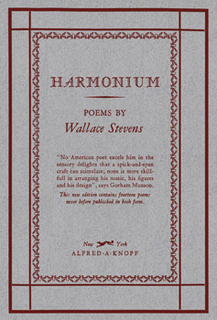Related Research Articles

Harmonium is a book of poetry by American poet Wallace Stevens. His first book at the age of forty-four, it was published in 1923 by Knopf in an edition of 1500 copies. This collection comprises 85 poems, ranging in length from just a few lines to several hundred. Harmonium was reissued in 1931 with three poems omitted and fourteen new poems added.
"Ploughing on Sunday" is a poem from Wallace Stevens's first book of poetry, Harmonium (1923). First published in 1919, it is now in the public domain.
"Hibiscus on the Sleeping Shores" is a poem from Wallace Stevens's first book of poetry, Harmonium. It was first published in 1921 and is therefore in the public domain.
"From the Misery of Don Joost" is a poem from Wallace Stevens's first book of poetry, Harmonium. It is in the public domain, having been published in the journal Poetry in 1921.
"O Florida, Venereal Soil" is a poem from Wallace Stevens's first book of poetry, Harmonium. It was first published in the journal Dial, volume 73, July 1922, and is therefore in the public domain.
"Last Looks at the Lilacs" is a poem from Wallace Stevens's first book of poetry, Harmonium. It was first published in 1923.
"The Jack-Rabbit" is a poem from Wallace Stevens's first book of poetry, Harmonium (1923).
"Floral Decorations for Bananas" is a poem from Wallace Stevens's first book of poetry, Harmonium (1923). It was first published Measure 26 and is therefore under copyright, however it is quoted here as justified by fair use in order to facilitate scholarly commentary.
"Of the Surface of Things" is a poem from Wallace Stevens's first book of poetry, Harmonium (1923). It was first published in 1919, so it is in the public domain.
"The Curtains in the House of the Metaphysician" is a poem from Wallace Stevens's first book of poetry, Harmonium. It was originally published in 1919, so it is in the public domain.
"Banal Sojourn" is a poem from Wallace Stevens's first book of poetry, Harmonium. It was originally published in 1919, therefore it is in the public domain.
"Depression Before Spring" is a poem from Wallace Stevens's first book of poetry, Harmonium (1923). It was first published in 1918 and is therefore in the public domain.
"Six Significant Landscapes" is a poem from Wallace Stevens's first book of poetry, Harmonium. It was first published in 1916, so it is in the public domain.
"Bantams in Pine-Woods" is a poem from Wallace Stevens's first book of poetry, Harmonium. It was first published in 1922 in the poetry journal Dial, along with five other poems, all under the title "Revue". It is in the public domain.
"Anecdote of the Jar" is a poem from Wallace Stevens's first book of poetry, Harmonium. First published in 1919, it is in the public domain.
"Tattoo" is a poem from Wallace Stevens's first book of poetry, Harmonium. It was originally published in 1916, so it is in the public domain. Librivox has made the poem available in voice recording in its The Complete Public Domain Poems of Wallace Stevens.
"The Wind Shifts" is a poem from Wallace Stevens's first book of poetry, Harmonium. It was first published in 1917, so it is in the public domain.
"Theory" is a poem from Wallace Stevens's first book of poetry, Harmonium. It was first published in 1917, so it is in the public domain.
"The Man Whose Pharynx Was Bad" is a poem from Wallace Stevens's first book of poetry, Harmonium. First published in 1921, it is in the public domain in the United States.
"Tea" is a poem from Wallace Stevens' first book of poetry, Harmonium. It was first published in 1915 in the journal Rogue, so it is in the public domain.
References
- Buttel, Robert. Wallace Stevens: The Making of Harmonium. 1967: Princeton University Press.
- Cook, Eleanor. A Reader's Guide to Wallace Stevens. 2007: Princeton University Press.